Related Research Articles

The Hellenic Army, formed in 1828, is the land force of Greece. The term Hellenic is the endogenous synonym for Greek. The Hellenic Army is the largest of the three branches of the Hellenic Armed Forces, also constituted by the Hellenic Air Force (HAF) and the Hellenic Navy (HN). The army is commanded by the chief of the Hellenic Army General Staff (HAGS), which in turn is under the command of Hellenic National Defence General Staff (HNDGS).
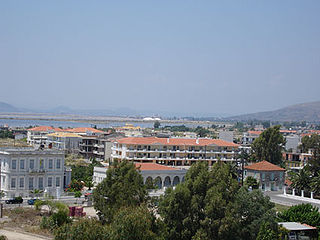
Missolonghi or Mesolongi is a municipality of 32,048 people in western Greece. The town is the capital of Aetolia-Acarnania regional unit, and the seat of the municipality of Iera Polis Mesolongiou. Missolonghi is known as the site of a dramatic siege during the Greek War of Independence, and of the death of poet Lord Byron.

Dimitrios Kallergis was a fighter of the Greek War of Independence, major general, politician and one of the most important protagonists of the 3 September 1843 Revolution.
Taxiarch, the anglicised form of taxiarchos or taxiarchē is used in the Greek language to mean "brigadier". The term derives from táxis, "order", in military context "an ordered formation". In turn, the rank has given rise to the Greek term for brigade, taxiarchia. In Greek Orthodox Church usage, the term is also applied to the archangels Michael and Gabriel, as leaders of the heavenly host, and several locations in Greece are named after them.

Odysseas Androutsos was a Greek armatolos in eastern continental Greece and a prominent figure of the Greek War of Independence.
The I Army Corps was an army corps of the Hellenic Army, founded in December 1913. Originally based in Athens and covering southern Greece, since 1962 it was responsible for covering Greece's northwestern borders. It was disbanded in 2013.
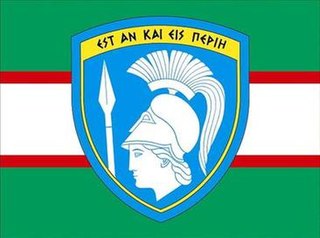
The 2nd Mechanized Infantry Division is a mechanized infantry division of the Hellenic Army.

The Destruction of Psara was the killing of thousands of Greeks on the island of Psara by Ottoman troops during the Greek War of Independence in 1824.
The 3rd Infantry Division was an infantry division of the Hellenic Army.

The Military-Political System of Samos was a provisional regime that existed in the island of Samos during the Greek War of Independence.

The London Protocol of 1830, also known as the Protocol of Independence in Greek historiography, was a treaty signed between France, Russia, and Great Britain on 3 February 1830. It was the first official international diplomatic act that recognized Greece as a fully sovereign and independent state, separate from the Ottoman Empire. The protocol afforded Greece the political, administrative, and commercial rights of an independent state, and defined the northern border of Greece from the mouth of the Achelous or Aspropotamos river to the mouth of the Spercheios river. As a result of the Greek War of Independence, which had broken out in 1821, the autonomy of Greece in one form or another had been recognized already since 1826, and a provisional Greek government under Governor Ioannis Kapodistrias existed, but the conditions of the Greek autonomy, its political status, and the borders of the new Greek state, were being debated between the Great Powers, the Greeks, and the Ottoman government.
Michail Komneinos Afentoulief or Afentoulis was a Greek who lived in Russia and served as an officer in the Imperial Russian Army. He is best known for his participation in the Greek Revolution and his activities on the island of Crete during the period 1822–23.
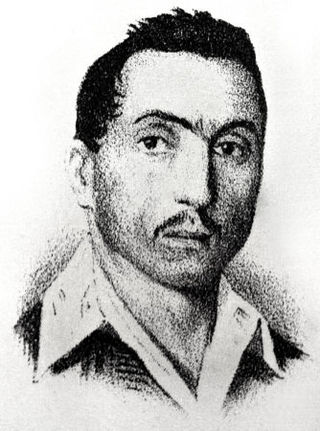
Christos Palaskas was a Greek chieftain during the Greek War of Independence. He was killed on 25 May 1822 by Odysseas Androutsos’s men, during an internal conflict.

Stefanos Chalis was a Greek chieftain and a fighter of the Greek War of Independence from Crete. He was the younger brother of fighters of the Revolution, Vassilios and Ioannis, who were also notable chieftains.

The 4th Infantry Brigade was an infantry brigade of the Hellenic Army. Originally formed in 1897, it served until 1912. Re-formed in the lead-up to the Greco-Italian War in 1940, it was expanded and renamed as the 15th Infantry Division after the war started. It was again reactivated in 1998, and served until 2013.
The Panellinion was the name given to the advisory body created on 23 April 1828 by Ioannis Kapodistrias, replacing the Legislative Body, as one of the terms he set to assume the governorship of the new country. The Panellinion was later replaced by the Senate during the Fourth National Assembly at Argos in July 1829. The body was named after the Panhellenion, a league of Greek city-states established by Emperor Hadrian.
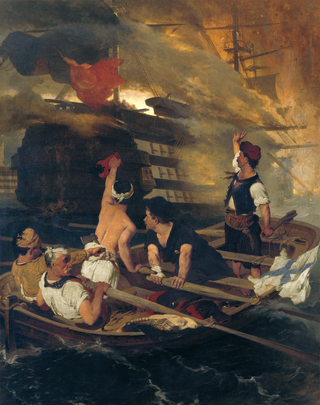
The burning of the Ottoman flagship off Chios took place on the night of 18 June 1822. The event, occurring during the Greek War of Independence, was a reprisal for the Chios massacre which occurred two months earlier. Two thousand Ottoman sailors were killed, as was Nasuhzade Ali Pasha, the Kapudan Pasha of the Ottoman Navy.

Ellinika Chronika was the name of a newspaper published by the Swiss philhellene, John Jacob Mayer, in Missolonghi, during the Greek War of Independence.
The Battle of Vasilika was fought on 10 June 1821 in Greece, between the Ottoman and the Greek forces led by the Captain Stamatios Kapsas.
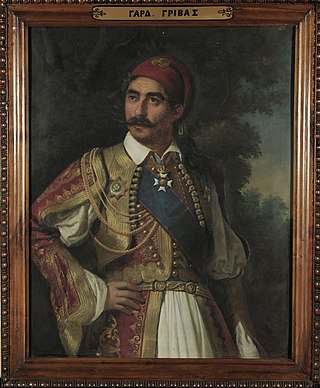
Gardikiotis Grivas, was a Greek leader in the Greek war of Independence in 1821. He distinguished himself in many battles, especially in the Battle of Arachova. He also served as Othon 's aide, undertaking to deal with the movement of 3 September 1843, as well as the rebellion of his brother, Theodoros Grivas.
References
- ↑ Towards Modern Greek Consciousness Archived 2010-09-11 at the Wayback Machine ., Loukia Droulia, The Historical Review/La Revue Historique, Vol 1 (2004)
- 1 2 3 Gigliucci, Francesco (1851). Checchi, Tip. di A. (ed.). Memorie della rivoluzione romana, Τόμος 1. p. 243. Archived from the original on 24 May 2024. Retrieved 30 June 2023.
- ↑ [ dead link ], note: Ιστορία του Ελληνικού Έθνους, Η Ελληνική Επανάσταση και η ίδρυση του Ελληνικού Κράτους (1821-1832) vol 12, Athens 1975, p. 212